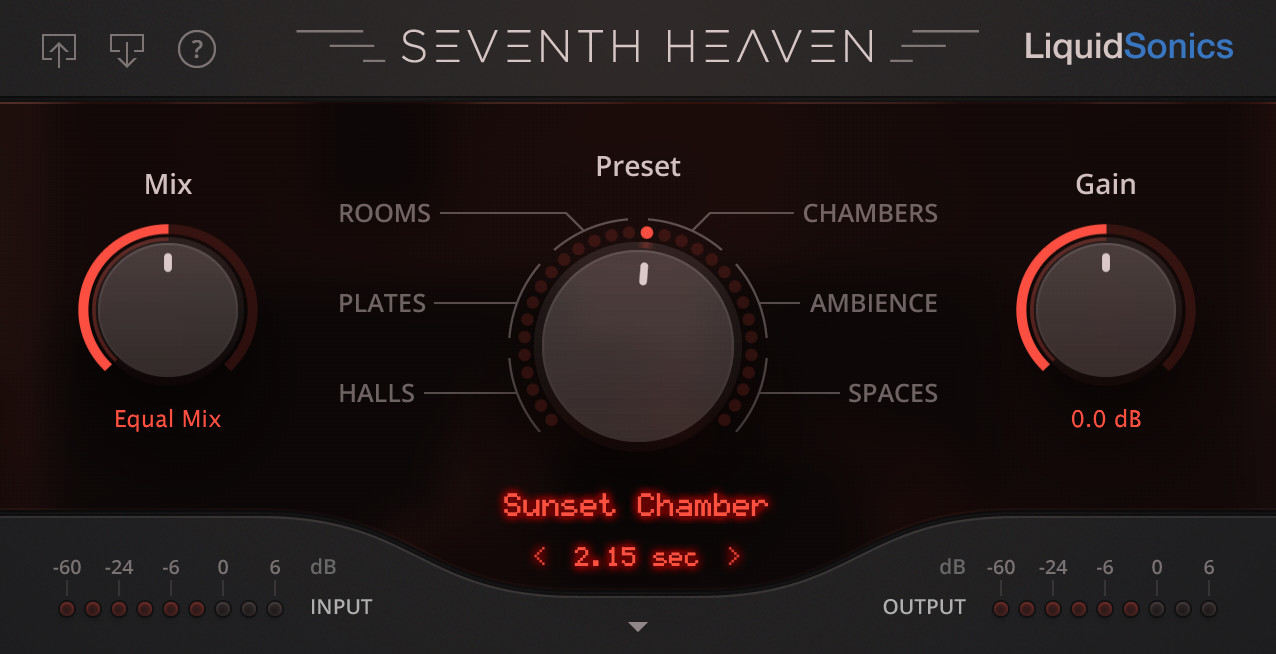New Software Review: Seventh Heaven by LiquidSonics

LiquidSonics aims to deliver the most faithful re-creation of the famed Bricasti M7 reverb sound with their Seventh Heaven plugin—can this plugin solidify a place in your mix template?
When the Bricasti M7 was released, it was a game changer for engineers, producers, and music makers all across the world.
Created by ex-Lexicon engineers to become the new standard in algorithmic reverb, the M7 is still highly coveted, and its impact has inspired much competition in the plugin world.
Software like Altiverb and Verb Suite have tried to emulate the M7’s distinctive sonic qualities, but LiquidSonics has since promised that “Nothing comes closer to M7 hardware in your DAW than Seventh Heaven.”
So let’s take a look and see how it fares.
Features
Seventh Heaven is built upon a process called Fusion-IR which uses a unique modulated convolution-based capture and reproduction technology developed specifically around the needs of the M7. A traditional impulse response capture of a Bricasti setting may not capture as much of the reverb quality as this process does, and later we will compare a Bricasti IR to Seventh Heaven.
The UI of this plugin is very easy to follow and is surely one of the most intuitive reverb plugin interfaces I’ve come across. The standard version (priced at $69) comes with a selection of the M7’s best halls, plates, chambers, rooms, spaces, and ambiences accessed via a single dial for ease.
The full Professional version (priced at $299) comes with every single preset included in the hardware M7. The Standard version comes with controls for mix, gain, pre-delay, delay, low cut, high cut, VLF (very low frequency), and early/late reflections. Any of the included 30 presets can be adjusted, and the pre-delay and multi-voice delay can even be synced to your DAW’s tempo.
In Use
The rich and silky decay of the M7 made it my go-to verb in college when I had access to the hardware for studio sessions. It made me feel like mixing music was faster as the sense of space it created really added a level of professional polish to my music. Seventh Heaven has proved to capture that subtle beauty of the hardware, and is a pleasure to use in my production and mixing workflow.
The intuitive interface makes it very quick to audition different types of reverbs. The basic high and low cuts are very useful for shaping your reverb sound and cutting unwanted frequency buildups. I also often find that I need to de-ess after my reverbs for vocals as sibilant frequencies can explode when run through reverbs—but I don’t feel like I need to de-ess my vocal reverb when using Seventh Heaven.
In my scoring workflow, I have 10 individual reverbs for each stem group, so I decided to swap all of them for instances of Seventh Heaven. Initially worried that it might tax my CPU excessively, I was relieved to see that it took up very little processing power. With my Macbook Pro 2019 running a blank Ableton session at a buffer size of 128, with the stock Grand Piano preset, it took about 15 instances of Seventh Heaven before Ableton started sounding a little frazzled.
Let’s take a listen to an example of a drum loop I made and processed with Seventh Heaven and a Bricasti IR for comparison:
The Seventh Heaven plugin sounds really natural to me and added noticeable dimension to the sound of the drums. The early/late mix control allowed me to precisely craft my reverb sound to include more early reflections, simulating a tighter space.
Let’s try the same experiment using a piano sample:
I do like the sound of my Bricasti impulse responses, but I have to say that Seventh Heaven sounds more like the hardware to me. I am now a full believer in their Fusion-IR technology; the depth of the sound is remarkable and I find it makes music just feel more interesting.
Click here to download the full resolution audio files.
To Be Critical
I spent a lot of time trying to think of what could be better with Seventh Heaven, and really only had one thought: You need an iLok plugged in to use it, and you can’t store your license directly to your computer. Barring that one minor hangup, this plugin has truly delivered on all fronts.
Summing it Up
For $69, Seventh Heaven gives you the sound of one of the greatest reverb units ever made. As a reverb buff, this plugin has truly amazed me, and I can see it becoming the new standard in plugin reverbs.
If you’re a fan of the M7 sound and have worked extensively with the hardware, I would highly recommend the Pro version of Seventh Heaven; if you aren’t too obsessive about certain presets, the Standard version should have plenty of options for your needs.
LiquidSonics has done a great job of presenting the sound of the legendary Bricasti M7, all from the comfort of your own DAW. You can try it for free for 14 days, and I highly recommend it to anyone looking to improve their use of space and dimension in their mixes!
Please note: When you buy products through links on this page, we may earn an affiliate commission.






